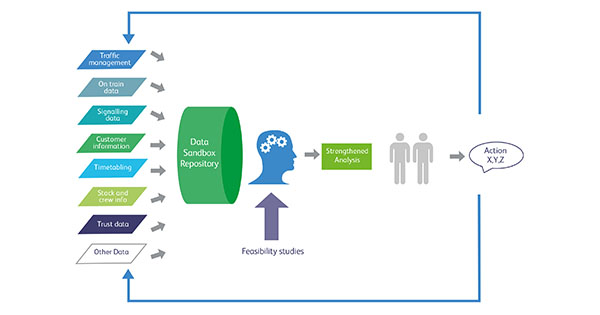Data Sandbox: giving innovators visibility of existing data

Relevant RTS critical priority(ies):
Data driven
The GB rail industry holds vast amounts of data, but currently only a small proportion of it is made open or shareable. Organisations including Network Rail and Rail Delivery group are leading the way in providing publicly available data feeds of data they own or manage on behalf of others, and such data is being used to good effect, not least within R&D.
However, there is a desire and need to increase the amount and range of data available, and use it to the value of the industry, to tackle some of its fundamental issues.
In 2017, RSSB launched the Data Sandbox initiative as a step on the way to greater data sharing. This was a £500,000 call for research to identify novel data-driven solutions to key network performance challenges, and rested on the establishment of a ‘mini data warehouse’ of industry data which was the most innovative aspect of the call.
The Data Sandbox provided a means for researchers to get access to sets of industry data that had previously not been shared. RSSB set up a framework confidentiality agreement for use of the data, freely enabling its use for agreed purposes.
For the original Data Sandbox set of research projects, which focussed on improving understanding of delay, the ‘data warehouse’ included 70 data sources, of which more than 60 were either newly accessible or accessible more easily.
The data was used in a range of new approaches, utilising machine learning, graph theory and data analytics, to make more accurate predictions about the impact of reactionary delays and dwell time variations. The findings were presented at a one-day ‘Enabling Better Performance’ conference on 4 April 2019.
Following on from the success of the first Data Sandbox, RSSB expanded the facility to include additional data sources, enabling a wider research call to be established. The Data Sandbox warehouse now includes nearly 90 data sources and is being used in innovative research to address a range of performance issues.
RSSB plans to continue building the Data Sandbox facility and the development of a Rail National Access Point, which is identified as a deliverable under the RTS data-driven workstream. The wider development of a National Access Point for transport has the aim of facilitating access, easy exchange and reuse of transport related data, and it is something that DfT is working on.
Back



